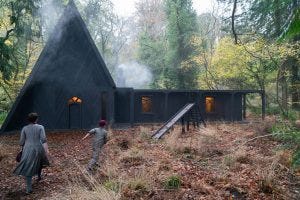Gretel and Hansel

We’re all too familiar with the rather dark reputation the Brothers Grimm have received among literary circles, particularly with their timeless fairy tales we’ve come to know so well. One of them, 1812’s Hansel and Gretel, remains a staple in folkloric literature, because who doesn’t love a story about two children who are abandoned by their parents, forced to live on their own in the woods, and come across a cannibalistic old lady who tries to eat them by boiling them to death? To say that director Oz Perkins puts an even darker spin into the tale is a bit of an understatement, but he nonetheless pulls it off (mostly) with his latest entry in horror, Gretel and Hansel.
Much of the original story remains mostly intact, or at least the major story beats. But Perkins delivers a radical revamping of the classic folkloric tale, providing plenty of visual pleasantries and atmospheric foreboding, while doing little with its predictable and disjointed story. It’s not meant to become a revolutionary piece of revisionist entertainment, but it’s still a unique and stylized experiment that is sure to provide satisfaction to the horror community, and even to some mainstream audiences. It’s not as memorable as one might want it to be, but it’s still a feast you’ll be glad you got to attend.
Gretel (Sophia Lillis) is struggling to provide for her widowed mother and younger brother Hansel (Samuel Leakey). Things grow dire, however, when their mother forces them out of the house after Gretel fails to acquire an admittedly discomforting housekeeping job. Forced to walk alone in the woods, the siblings struggle through strangers, starvation, disorientation, and isolation, all of which begin to consume them. But their hopes seem to perk up when they stumble upon an old wooden house, smelling of a feast of cake, bacon, and other delectable treats. They are greeted by the owner of the home, an old woman named Holda (Alice Krige), and are permitted to stay, with Holda taking Gretel under her wing. But things aren’t as they seem, as Gretel begins to suspect something sinister beneath her pleasant demeanor while Holda believes Gretel holds within her an untapped power, a power just waiting to be awakened.
We all remember how the original tale plays out and ends, and for the most part, it plays out the same way here. However, it’s always a delight to see a director take a rather simplistic and straightforward story and try to fill the gaps in the story, turning it into something much more poignant than it has any right to be. In the case of Gretel and Hansel, however, that poignancy is hit or miss. Often Perkins’s aesthetic and thematic decision-making succeeds on many fronts, but he also often stumbles in his attempts to expand the story.
This is especially true with how the characters often either don’t get a chance to grapple with their newly infused thematic qualities or are carrying a heavy load of it on their backs, making for a rather predictable and imbalanced story. Sometimes it feels as though Perkins is doing too much with his horror-infused aesthetic to get the messages across and other times it feels like he isn’t going far enough. There’s an imbalance of what he’s trying to get across, and while the messages are perfectly clear and understandable, that imbalance can be off-putting.
But where the film lacks in story is more than made up with Perkins’s vibrantly ominous direction. Galo Olivares’s stunning cinematography helps bring extra dread and horror to the eerie woods and the oddly geometric household of the Witch, adding a sense of unpredictability and unknown into the already stellar production design. Much of the credit should also go into Olivares’s effectively disorienting use of wide angle lenses to shape and warp the surrounding environments, whether out in the woods or within the “comforts” of Holda’s home. With the addition of an effective synth score composed by Robin Coudert, all of it comes together to create a world that is truly out to get Gretel and Hansel, a world that has some sort of threat around every corner and you’ll never know what lies beyond or within.
Sophia Lillis makes for an acceptable and worthwhile modern rendering of the Gretel character. There’s a reason the title is Gretel and Hansel, because this ultimately her story. It’s about her accepting her transition into womanhood whilst traversing through a harsh and bitter world around her, filled with the real perils of a patriarchal society as well as the fantastical and mystical threats that lie within the woods. With that in mind, Lillis maintains a calm and steady composure while also making room for tenacity and reserved confidence in times of hardship. Her little brother, however, isn’t as memorable or emotionally attachable as he merely serves as a way of developing Lillis’ character.
Alice Krige, on the other hand, is something else entirely, officially becoming 2020’s first worthwhile, menacing, and all around delectably entertaining villain in Holda the Witch. Her persona is calm and patient, masquerading her intentions with a suspiciously kindred and peaceful façade whilst also acting as a foreboding presence who has plenty to hide and keep secret. Her make up is impeccable, her acting is silent but deadly, and her overall demeanor adds an extra sense of dread and mystery to the film as a whole.
Gretel and Hansel is something that should be appreciated and admired, at the very least. Not all of what Perkins envisioned comes together as cohesively as we may have wanted, but his intentions and the time and effort he put into it are apparent. His artistic production, eerie direction, and worthwhile performances are to be commended, and they add up into a sinister, spellbinding enchantment that will leave you in a hypnotic trance for its 87-minute runtime.
https://www.youtube.com/watch?v=QZblQLhKcZQ&t=1s&w=585



